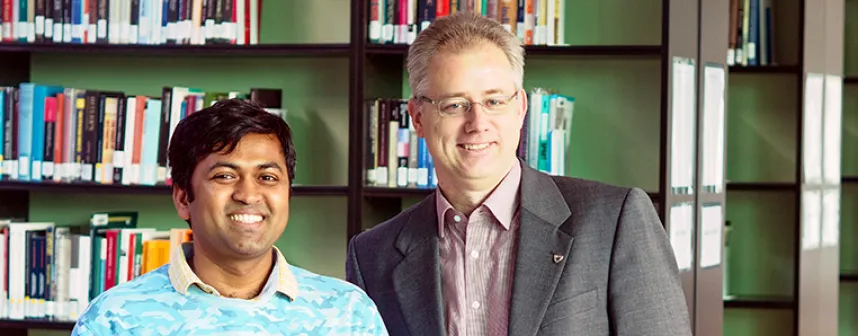Improving the effect of antibiotics: Humboldt Fellow Researches at Jacobs University Bremen
January 28, 2020
Computer simulations of biological systems can help to understand molecular processes in detail. For example, they make it possible to simulate the transport of molecules through biological membranes. An important area of research is the transport of antibiotic molecules through bacterial membranes so that they can exert their healing effect. The comprehension of these processes is very important for the development of new antibiotics. To better understand them is one of the goals of Dr. Kalyanashis Jana, who is a fellow of the renowned Humboldt Foundation spending two years researching in the group of Dr. Ulrich Kleinekathöfer, Professor of Theoretical Physics at Jacobs University.
Biological membranes separate the inside of a cell from its environment or encapsulate certain parts of a cell. Bacteria have quite complex outer membranes that are interspersed with pores so that nutrients can be incorporated and degradation products can be removed. These pores are also used by many antibiotic molecules to penetrate bacteria and stop important processes. Computer simulations are of great importance in understanding these transport processes. They provide a very detailed picture of the mechanisms at the molecular level. A better understanding of these processes is also important, for example, to better understand the nutrient uptake of intestinal bacteria.
The simulation of biological processes using computers is a specialty of Prof. Kleinekathöfer. It was his expertise that brought Dr. Kalyanashis Jana to Jacobs University in Bremen, Germany. "Here I have the opportunity to expand my skills in simulations of membrane proteins using different computer-based methods," says the Indian chemist who most recently did research at Denmark's Technical University (DTU) based in Lyngby near Copenhagen.
The Alexander von Humboldt Foundation supports the intercultural dialogue between German and foreign academics through academic exchange. The fellowships are highly respected. Every year, the Humboldt Foundation provides more than 2,000 researchers from all over the world with the opportunity of an academic stay in Germany. The Foundation maintains a network of more than 29,000 Humboldtians from all disciplines in over 140 countries worldwide - including 55 Nobel Prize winners.
